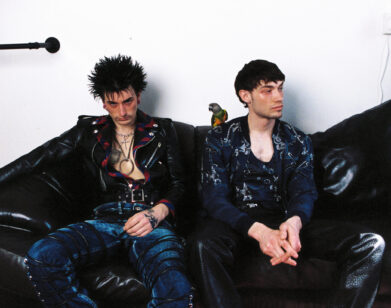Zola Jesus is a Romantic

ZOLA JESUS
With her striking looks and massive voice, it’s hard not to be taken with the pixie-sixed 22-year-old ingénue Zola Jesus. In fact, a disclaimer: the author of this piece is an utter devotee of all three of her full-length albums, the third of which was released this fall. While the earlier two embrace spookiness and mood, Conatus‘ feel is expansive, using live strings and mechanical overtones to create a full-bodied album, punctuated by Zola (AKA Nika Danilova)’s operatic vocals.
Though she taps into atmospherics reminiscent of early 4AD bands like Cocteau Twins and This Mortal Coil, Danilova’s dark sounds are uplifted by the power of her vocals, which climb rather than fall. Sparse and organic pianos are paired with bass drums or synths—not a new combination, but with her powerful voice, the effect is arresting. Live, Danilova forgoes the solo act and is accompanied by real drums and synths. As always, her pitch is perfect.
LEILA BRILLSON: So, right before the release of your new album, you had two collaborations from two very different ends of the spectrum, with Pictureplane and M83, respectively. How did that come about, especially with you closing your album?
NIKA DANILOVA: Pictureplane happened a long time ago. He had asked me to sing on one of his songs, and he sent it to me eight months before his release. And we were waiting on it, but then it got down to the last minute and I got busy. So then I sent him back the vocals, and it turned into such a cool song. With M83, Anthony and I had gotten in touch with each other at the same time because we both wanted to collaborate. It was a kismet that we both felt simultaneously. So we got together and really got along, and he sent me the song and I immediately felt it was really beautiful. I knew exactly what to do, went over to the studio, and laid down the vocals. It was magic!
BRILLSON: Conatus is being performed by a live band. Did you write the album to be played by others? How much of Conatus did you produce on your own?
DANILOVA: I do mostly everything on my own. I write the songs from the ground up. For this album, I required some acoustic elements. So I found a piano so I could retrack things, I found a violinist and a cellist to retrack things. My drummer would play the beats I wrote, so I could add live drums. From that, I brought more people into the process. But still, it was very under my own control… for better or for worse!
BRILLSON: The piano aspects of a lot of your songs are very repetitive, and build from a simple element. It gives the acoustic elements a stark feel.
DANILOVA: I really love minimalism. Pianos have so much you can do with them, but I think it’s the little things that are the most effective, like Philip Glass or John Cage.
BRILLSON: The album seems to have interplay between the organic nature of the female voice or the pianos, but then your single “Vessel” has such a grinding, metallic sound. Can you talk about this dynamism?
DANILOVA: Everything I do is a reflection of the duality within me. Musically, I really love things that are very synthetic and unnatural. And I also like the organic and human… the intrinsic, I guess. I always try to reconcile the dichotomy between the two and make it into something that is unique.
BRILLSON: Are there other art forms you admire that also wrestle with this duality?
DANILOVA: Science fiction. Not only is it fictional, but it’s totally unrealistic. The content could never happen, or not happen for a very long time. But it is still a reflection and metaphor for very human problems. It’s an exploration of very unnatural things in a very real way.
BRILLSON: Speaking of duality, I personally found with Conatus that the sound shifts from despair to revelatory hope. Though it is downtempo and dark, lyrically you are filled with plenty of reassurances. Do you set out to fight the dark with light?
DANILOVA: I can’t make anything without it having a purpose. My music started as a way to break through weaknesses—like anxiety, which was completely taking over my whole life, where I could barely function. And everything I do, especially Zola Jesus, has been tackling the overwhelming aspects of life, understanding what you fear, understanding what you can’t do, and then trying to challenge it all. It might be a Napoleon complex. But everything I do has a sense of hope and perseverance.
BRILLSON: I like to describe your music as love songs written in the key of break-up songs. Which do you like better?
DANILOVA: The only reason I would write a break-up song is because my own problem of allowing myself to relate to people. When you fall in love, you become weak. It’s kind of psycho, but I feel like falling in love is an amazing, incredible feeling… but at the same time, you are giving into something. Falling in love is like falling under a spell. But I have fallen in love and I am under the spell, and I’m having to reconcile that, I guess.
BRILLSON: You once told me your good luck charm is your wedding ring. Do you draw strength from your husband? And the vulnerability of romantic love?
DANILOVA: I think if I had never fallen in love, I would have become completely impenetrable. I couldn’t come to terms with my vulnerability.
BRILLSON: You and your husband are in two totally different industries, right?
DANILOVA: He’s an entomologist, which is awesome.
BRILLSON: Does he give you help titling songs with cool bug names?
DANILOVA: Well, I guess “Ixode” is technically a bug. It’s a tick. Actually, that’s technically not a bug, but you would have to take that up with him. As far as my titles go, I just like creating titles that have their own meaning in them.
BRILLSON: As a fellow Midwesterner, I know how stark the winters are in Wisconsin. But you are in LA now. How did the change in weather affect your writing?
DANILOVA: Conatus is the first record I couldn’t return to write in the winter. I was in LA during the winter. I felt so stumped, so stuck. Something wasn’t right. It actually made me kind of obsessed with winter, snow, and ice. I don’t really like the heat. It doesn’t inspire anything in me except feelings of comfort. So I watched a lot of documentaries about Inuits and Eskimos.
BRILLSON: What is the hardest song for you to sing live?
DANILOVA: Emotionally?
BRILLSON: And physically.
DANILOVA: It’s funny, because a lot of songs on Conatus are emotionally stark. Like the song “Palms” (“Lick the Palm of the Burning Handshake”) has a chorus that says, “The need to know will take you over, and the need to grow will take you under,” which is very simple. And the very end part says, “I’m the one you need. I’m not the one you need.” And it’s so stupid! I hate saying the lyrics! But… when I am singing it in front of people, it changes. Sometimes I feel like I have something I want to offer, I want to offer some ideas. But at the same time, I’m nothing and you shouldn’t listen to me. It is this very simple, basic thing I repeat over and over that people don’t realize, for me, means everything.
ZOLA JESUS’ ALBUM CONATUS IS OUT NOW. SHE WILL CONTINUE TO TOUR THROUGHOUT THE FALL. FOR MORE ON THE ARTIST, VISIT HER WEBSITE.






